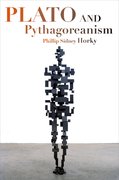Upon my return from the excellent Northern Association for Ancient Philosophy meeting in Glasgow, on which see Peter Adamson’s blog, I was happy to see that a used book I had ordered had arrived in my pigeonhole. Now I’ve been ordering a lot of books lately, in order to fill in some of the gaps in my collection (including my fantastic almost complete set of Bekker’s 1837 Oxford edition of Aristotle’s works, which, although I managed to get hold of Volume II, still lacks Volume IV). So I wasn’t quite sure what to expect, until I opened and saw that it was a volume of Diels-Kranz’ Die Fragmente der Vorsokratiker that I had ordered from America. Somewhat infamously for someone who works chiefly on Presocratic philosophy, I do not yet own a complete edition of Diels-Kranz, so I have been trying to remedy this by buying up the three volumes. There is a problem, though: good original editions of Diels-Kranz are quite expensive, so I was quite happy to get hold of even just one volume for a measly $30 US (including shipment costs to the UK).
Now, the vintage book store’s entry in Abebooks was quite vague, and they even left off saying which volume it was; it was fine for me, however, to know that it was the 6th edition in hardcover (1952), and any of the volumes would do for that price. Somewhat to my chagrin, however, when I opened the package, I saw Volume II on the spine. Hmmph. I really needed Volume I, but Volume II would just have to do.
And this is when Fortuna’s wheel kicks in. The book was full of annotations in pencil, which probably brought its price down (it was listed as in ‘fair’ condition); but have a careful look at the first page if you can see it:
It’s quite hard to decipher because of the quality of my photograph, but if you look carefully, you can see that it says:
Gregory Vlastos
Department of Philosophy
Princeton University
Princeton, New Jersey
I’d hit the jackpot. Somehow, Vlastos’ copy of Diels-Kranz had been broken up, scattered around the world, and become relics, like pieces of the body of Osiris or of the Virgin Mary. OK, maybe that’s a bit too hyperbolic an assessment of Vlastos (who, even if he might not have been a true sophos, was certainly a philosophos). But consider the sorts of insights that one might obtain from Vlastos’ marginalia and glosses, which, ironically, effected a reduction in the price of the book. I give one example, on the first four ‘B’ fragments of Anaxagoras:
A careful analysis of the glosses reveals passages that Vlastos saw as relevant to Anaxagoras’ fragments in off the wall places (Herodotus I.204; Plato, Timaeus 84e and Theaetetus 158d); references to contemporary scholarship (e.g. Bignone); and evaluation of Simplicius’ own analysis of the passages he quotes. Here as elsewhere, Vlastos gives his assessment of Diels’ work, challenging his translations, drawing links between B and A fragments that had been overlooked, and providing addenda not noticed by Diels or Kranz. Even passages underlined with squiggles – especially those embedded in the sometimes impenetrable testimonia of figures such as Alexander of Aphrodisias and Simplicius – cast new light on the fragments of Anaxagoras, Democritus, Diogenes of Apollonia, and Protagoras, among others.
There is wisdom, I think, in marginal notes. They can even be used to help us reconstruct ancient textual and performance practices: a group of scholars at Harvard’s Center for Hellenic Studies is currently pursuing the project of constructing an online multitextual edition of Homer’s works, based on so-called ‘deviant’ texts preserved in the marginal notes of Byzantine and Medieval scribes. The idea seems to be that marginal notes preserve alternative performance traditions of the lines which were excised by Hellenistic editors of Homer’s text. I should have something more significant, or perhaps even more precise, to say about how scribbles and glosses help us to obtain or even forge new, and non-teleological, paths through textual collections (such as Homer’s editions) and collocations (such as Diels-Kranz). In lieu of doing so, however, I solicit comments from the readers.



